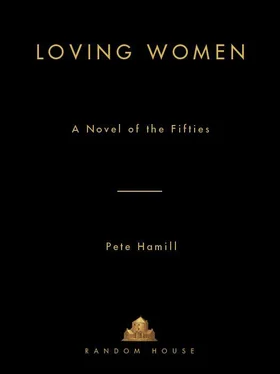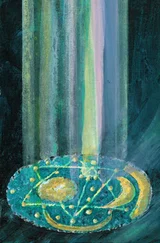He sounded like Becket. Or Brooklyn. I smiled, trying to look like the All-American boy I wasn’t.
“Hell, no, officer. I’m just lookin for a boardin house. I’m headin for California. Start a new job out there next month.”
“Where in California?”
“Uh, San Diego. Ever been there?”
“Durn da war. I gotta sister in Santa Barbara. She loves it out dere. Me, I like here . Da food out dere — hey, eat before ya go.”
“What about that boardin house?”
He scratched the side of his cheek and then pointed me toward Decatur Street, where, he said, there were plenty of rooming houses. The fastest way was through the railroad yards, but I’d better be careful of the trains and the hoboes.
“The other way to get to da same place is go back down Canal, right here, to, say, Charters Street. Den cut right into the French Quarters, into the Voo Kuhray. On da right. You keep goin to Jackson Square and make another right over to the waterfront and—”
There was a sudden squeal of brakes, and the sound of rammed metal. Two cars angling for position on the Algiers ferry had smacked into each other.
The cop hurried over. I drifted back down Canal Street. At Chartres, I turned right. The street was narrow and badly lit, with high rough walls rising on either side and cobblestoned streets and a sickly rotting odor seeping from somewhere, as if the heat were boiling sewage beneath the streets. There were several winos sitting on the sidewalk, their backs to the walls. All white. One of them came over to me. His eyes looked scraped. His skin was loose. He put a hand on my flight bag and grinned. In the dim light, he had almost no teeth.
“Whatchoo got there, boy?”
“Hands off,” I said.
He jerked on the bag and I pulled it away and shoved him. He whirled and faced me, both hands poised, a blade in his hand.
Shit .
The other winos didn’t move. They didn’t even seem very interested.
This is stupid. This ain’t why I came here .
I backed up.
I don’t want to die this way. I don’t want to die at all. I have to find my loving woman .
The wino said, “You got somefin you wanna do , boy?”
I turned and ran.
Along Chartres Street, then right, then left again. I ran for a long time, until I got brave enough to look behind me and saw steam rising on the empty streets but no wino with scraped eyes. I slowed to a walk. There were more little bars, with yellow light spilling onto the sidewalks. Scraps of music filled the air. Distant Dixieland. Bebop. Black music. The notes came from here and the bass lines from there. I imagined people dancing in hidden rooms. I was very hot.
Then I saw the OTEL.
The H was out in the red neon sign and the place had no other name. It was on a corner. The front door was open, so I went in. There was a small lobby, with fluorescent lights on the high ceilings and a fan beating slowly and doing nothing to the thick hot air. A fat whore sat on a couch watching TV. There was no reception counter, only a booth, like the kind you see outside movie houses. A thin man with yellow skin looked up at me. He had a cigarillo stuck in his mouth.
“Yeah?”
“I need a room,” I said. “What are the rates?”
“Three bills a night. In advance . A buck extra if you bring in a broad.”
“Three nights,” I said, and gave him a ten-dollar bill. He handed me back a dollar and the key to room 127.
“One flight up,” he said, without removing the cigarillo. A staircase behind the Coke machine led upstairs.
The room was narrow, with a bare yellow light on the high ceiling. The furnishings revealed themselves in bits and pieces: a bed, a bureau, a night table; a 1952 calendar with a picture of Miami Beach; a small sink; a pale-blue spread over the bed, with little white wool balls all over it.
No telephone.
No bath.
I sat down heavily on the edge of the bed.
I noticed a wire mesh over the windows. A stain on the wall looked like Italy. I was very hot. I leaned back and was soon asleep.
In New Orleans.
Where Eden Santana lived her life.
For two days, I searched for her through the streets of the city. I started with the telephone book (none in the room, none in the lobby, found them hanging in a post office), looking up all the Santanas in New Orleans, calling each of them, receiving baffled replies as I begged for information. After each call, I left my name and the number of the hotel. I remembered old movies and detective stories and the way private eyes relentlessly tracked the missing. I went to the gas company, asking for records on Eden Santana or James Robinson. The woman behind the counter looked at me as if I were crazed and then called over a superior.
“That’s confidential info’mation, son,” a hairless blue-eyed man said. “Why you want that?”
I couldn’t tell him, so I fled. Then I thought of going to the newspapers, the Times-Picayune or the States-Item , and asking to look at their clippings for James Robinson. If he was so bad, there must have been stories about him in the papers. But when I called up and asked if I could look at their clippings they wanted to know why I needed to see them and I said I was a student writing a term paper and a woman said, “Well, honey, whyn’t you git yaw pifessor to write you a letter , and we see what we can do …”
And, of course, I couldn’t go to the police.
By noon of the first day, I was exhausted and hot, sitting on a bench in Jackson Square. I was very thirsty. I saw a guy selling shaved ice dyed with juice and asked for cherry. It was sweet and cold and when I finished, I ordered another. They were three cents each. I gazed around the square and saw painters with easels setting up under the arcade and I wondered what would happen if I did find Eden and then thought, Well, maybe we could just live here .
For I had come to think of New Orleans as the most beautiful city I’d ever seen. Hour after hour, I walked through the cobble-stoned streets of the French Quarter, peering into dark entryways to the gardens within, with their fountains and plants and birds. I was filled with a sweet sense that they were from another century, the time of the French and the Spaniards, sealed off and protected from the present by their heavy iron gates. Leaning on the rough plaster walls, my body burning from the summer heat, I gazed into the cool interiors and thought of Eden’s people long ago, coming down the river to find husbands here for their women, while white dandies went to the quadroon balls and picked out their own women and installed them in these houses. Upstairs, behind the balconies with their scrolled ironwork, I could see bedrooms with high ceilings and they must have lain there in the hot summer afternoons, naked to the breeze or the stirred air made by ceiling fans. The rooms made me think of a painting in the Craven book, a naked woman lying on a couch, in the company of a black cat and a black woman. Except that here in New Orleans, in my version of the painting, the naked woman was black and the cat was white and an even blacker woman was looking on.
On that first night I wandered everywhere, drawn not only by Eden now, but by the city itself. Before going out, I made a drawing of her face and carried it with me as I started visiting the bars. I went down to Bourbon Street, where Dixieland music blared from the honky-tonks, and I talked to bartenders and doormen and whores, showing the picture, asking if they knew her.
As the hours passed, the air grew thicker, more feminine. Around midnight, I stood for a long while at the corner of St. Peter’s and Bourbon, listening to a white Dixieland band, looking at faces. There were hundreds of tourists and locals moving down the packed street, speaking a dozen dialects of English, talking in French and Spanish and German. There were a stream of faces: flabby, compressed, blank, sharp, beautiful. None was hers. I could smell coffee somewhere, and came again to Jackson Square, and saw lights along the Mississippi. I was very hungry. Across the street, beside the river, was a place with outdoor tables and black waiters. The Café du Monde. I didn’t know French but thought about my high school Latin and figured it out.
Читать дальше












